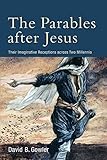The Parables After Jesus : Their Imaginative receptions Across two Millennia / David B. Gowler.
Material type: TextPublisher: Grand Rapids, MI : Baker Academic, 2017Description: xv, 301 pages : illustrations ; 22 cmContent type:
TextPublisher: Grand Rapids, MI : Baker Academic, 2017Description: xv, 301 pages : illustrations ; 22 cmContent type: - text
- unmediated
- volume
- 9780801049996
- 0801049997
- 226.80609 23 G723
- BT375.3 .G69 2017
| Item type | Current library | Call number | Status | Date due | Barcode |
|---|---|---|---|---|---|
 Books
Books
|
New Theological College General Stacks | 226.80609 G723 (Browse shelf(Opens below)) | Available | 00031663 |
Includes bibliographical references (pages 275-288) and index.
1. The Afterlives of Jesus' Parables in Antiquity (to ca. 550 CE) : Irenaeus, The gospel of Philip, Clement of Alexandria, Tertullian, Origen, John Chrysostom, Augustine, Macrina the Younger, Ephrem the Syrian, The good shepherd in early Christian art, Illuminations from the Rossano gospels, Byzantine mosaics, Romanos the Melodist -- 2. The Afterlives of Jesus' Parables in the Middle Ages (ca. 530-1500 CE) : Gregory the Great, Sahih al-Bukhari, Wazo of Liège, The golden gospels of Echternach, Theophylact, Hildegard of Bingen, Chartres cathedral, Bonaventure, Thomas Aquinas, John Gower, Antonio Pulci, Albrecht Dürer -- 3. The Afterlives of Jesus' Parables in the Sixteenth and Seventeenth Centuries : Martin Luther, Anna Jansz of Rotterdam, John Calvin, John Maldonatus, William Shakespeare, Domenico Fetti, George Herbert, Robert Williams, Rembrandt Harmenszoon van Rijn, John Bunyan -- 4. The Afterlives of Jesus' Parables in the Eighteenth and Nineteenth Centuries : William Blake, Søren Kierkegaard, Frederick Douglass, Fanny Crosby, Leo Tolstoy, John Everett Millais, Emily Dickinson, Charles Haddon Spurgeon, Adolf Jülicher -- 5. The Afterlives of Jesus' Parables in the Twentieth and Twenty-first Centuries : Thomas Hart Benton, Parables and the blues : Rev. Robert Wilkins, Flannery O'Connor, Martin Luther King Jr., Godspell, Two Latin American receptions: the peasants of Solentiname, Elsa Tamez, David Flusser, Octavia Butler -- Conclusion : What do parables want? -- Appendix : Descriptions of the parables cited in the interpretations.
Jesus's enigmatic and compelling parables have fascinated their hearers since he first uttered them, and during the intervening centuries these parables have produced a multitude of interpretations. This accessibly written book explores the varying interpretations of Jesus's parables across two millennia to demonstrate how powerfully they continue to challenge people's hearts, minds, and imaginations. It covers more than fifty imaginative receptions from different eras, perspectives, and media, showing how the use of Jesus's parables affects society and culture and offering a richer appreciation for Jesus's most striking teachings.


There are no comments on this title.